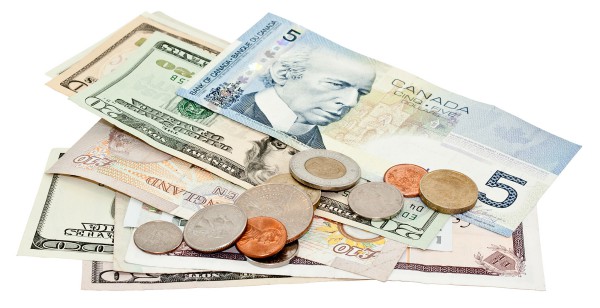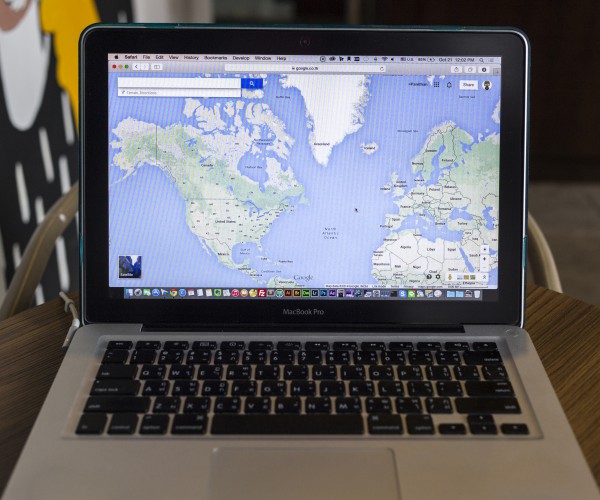Financial Tales of a Digital Nomad
- July 7, 2017
- by Steven

My name is Steve Gilbert. I grew up in New Jersey. Went to college in Wisconsin. And I've been living and working remotely in Latin America the last half decade. Many people would call my lifestyle that of a digital nomad because my main source of income comes from work on the computer and I travel regularly. Which means I've amassed a wealth of knowledge when it comes to financial matters of living abroad. And today I share some of my insight with you.
Spending money
If you live in a foreign country, how would you spend money? And I don't mean 'how' in the sense of what you would spend your money on versus not. I mean, literally, how would you spend money? Would you use cash? Debit card? Credit card?
This is what I do:

Above all I follow the cardinal rule: Avoid fees.
All kinds of fees pop up when you spend money abroad. The big ones include:
- Currency conversion fees
- Foreign transaction fees for debit and credit card use
- And ATM withdrawal fees
In Uruguay I worked for a software development company where I headed up business development. And the company opened up a Uruguayan bank account with Itaú on my behalf. And I was paid in Uruguayan pesos. The company direct deposited my salary in Uruguayan pesos to my Itaú checking account every month.
This meant I could use my Itaú debit card to make purchases and withdraw cash at ATMs in Montevideo (the capital of Uruguay and where I was living)—without incurring fees, barring the occasional ATM fee, because I was using a Uruguayan financial product in Uruguay.
So in Uruguay I would make purchases in cash and with my local debit. Or if the merchant accepted credit card, I would use my U.S.-issued No Foreign Transaction Fee credit card, which I discuss in a moment.
I’ve also lived in Colombia and Mexico where I’ve mainly worked remote and earned USD. I decided not to go through the minor headache of opening up a local bank account, in large part because it hasn’t been necessary. Why?
Because my wallet is a fee-zapping lightsaber.
I use Charles Schwab’s Bank High Yield Investor Checking Account to withdraw cash at ATMs because Schwab reimburses you all ATM fees and doesn’t charge you a currency conversion fee. You insert your Schwab debit card into an ATM and receive cash in local currency—at the market exchange rate (most U.S. debit cards will charge you a currency conversion fee, which you want to be mindful of). And if the local bank charges you an ATM fee, Schwab rebates you at the end of the month.
Meaning Schwab has had my cash needs covered. No crazy exchange rate fees at airports or currency conversion houses.
Whenever I can, however, I make purchases with my No Foreign Transaction Fee credit card. My card of choice is Capital One Spark. Fundera has a break down of the different flavors the card comes in.
A No Foreign Transaction Fee credit card is a credit card that doesn’t hit you up with a fee for using the credit card abroad, which can be 1% to 3% of your purchase.
I use my Capital One Spark at every opportunity I get because 1) there’s no foreign transaction fee, 2) I get the market exchange rate, and 3) and I earn 2% cash back on all purchases.
To sum up, the way I spend money abroad is: I first reach for my No Foreign Transaction Fee credit card because of the aforementioned benefits. And if I can’t use it, I pay in fee-less cash because I use Schwab’s debit card to obtain cash or my local bank account’s if I have one.
Health insurance
I don't have employer-based health insurance because I’m a business owner and independent operator. As such I'm responsible for finding health insurance on my own. And I’ve secured a plan that covers eligible medical expenses abroad.
If you keep your U.S. insurance and live abroad, the main thing you want to confirm is that foreign medical expenses are covered. And importantly you have catastrophic coverage.
I haven’t purchased health insurance in a foreign country, and so don’t have experience navigating that world. I did once however have to navigate a hospital in Mexico City because of a toe infection. And I paid for the care out-of-pocket. I collected the receipt and necessary documentation. And then submitted a claim to my American insurer. All standard business. I was reimbursed for part of the medical expense.
Depending on the country, note too that many medical services are flat out less expensive (and still high quality) in foreign countries, and so can be paid for out-of-pocket without much distress. The sweet spot is finding a country with low cost of living and high quality medical care.
Basic needs: Food, shelter, clothing
A huge benefit of living in low-cost of living/high quality of life cities, like those that I’ve lived in, is you receive all the amenities and culture of a New York or Paris at much less cost. Every day is one big discount without sacrificing quality.
At least that’s the case with food and shelter. I’m not sure about clothing because I never went shopping for clothes abroad, as the need never arose. The clothes, purchased in the U.S., I packed kept me comfortable and looking good.
Like any city, rent depends on the neighborhood you live in. In Bogotá I’d say the range among my friends and acquaintances is between $200 and $800 dollars of rent per month.
And as for food, if I don’t make lunch myself, a typical lunch in Bogotá won’t cost me more than $3.50—and that includes juice, soup, a main dish, and a little sweet dessert at the end. In terms of price and quality and taste, there's no comparison between the average meal in a Colombia versus a U.S. Colombia wins out.
Cell phone
I have two phones: an iPhone and an Android.
And I use my iPhone abroad because it’s older and I’ve designated it my “living abroad” phone. I’ve unlocked it and I purchase SIM cards in each country I live in. And I get on a no-contract prepaid aka pay-as-you-go plan.
In the U.S. I use Project Fi, Google’s no-contract cell phone service which saves me big money.
Project Fi makes getting local SIM cards unnecessary because Fi phones (all of which are Androids) can be used internationally at reasonable rates. But, when I’m living abroad somewhere, not just traveling through, I still use the iPhone/SIM card setup (and pause my Fi service) because I like having a local number and keeping the purpose of the phones separate.
Taxes
From the IRS:
If you are a U.S. citizen or a resident alien of the United States and you live abroad, you are taxed on your worldwide income. However, you may qualify to exclude from income up to an amount of your foreign earnings that is adjusted annually for inflation ($92,900 for 2011, $95,100 for 2012, $97,600 for 2013, $99,200 for 2014 and $100,800 for 2015).
This is called the Foreign Earned Income Exclusion, and if you meet eligibility requirements can be a significant boon to your nest egg. Other potential tax benefits of living abroad you’ll want to investigate include the foreign housing deduction and foreign tax credits.

Saving
If you live in a low cost of living country, earn USD, and spend in the local currency, you are on the fast track to financial independence because your saving rate explodes. If you’d like to learn more about this path, I discuss it at length in an article called Tropic Mango on Gilbert Index.
If you have any questions, you can find me on Twitter at @gilbertginsberg.
Happy travels.








